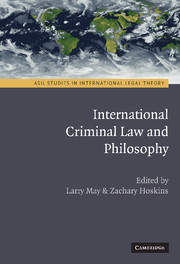Introduction
Published online by Cambridge University Press: 19 January 2010
Summary
This volume brings together some of the best recent work by philosophers and legal theorists on the conceptual and normative grounding of international criminal law. Philosophers and other theorists are only just beginning to write about the emerging field of international criminal law. International law has taken a significant turn in recent years. Rather than being primarily concerned with the relations of states, one significant branch of international law – namely, international criminal law – now concerns the relations of individuals, specifically, the responsibility of individuals for mass atrocities. As with any such change, there are many questions and problems that arise. In our book, we begin with considerations of the conflict between state sovereignty and universal jurisdiction; examine thorny issues raised when the victims or the perpetrators of international crimes are groups or corporations; proceed through various specific questions related to justice and human rights; and conclude with chapters on how international criminal trials should be seen in terms of theories of punishment and reconciliation. Throughout, these chapters relate thinking in political philosophy, ethics, and jurisprudence to cases and issues in the practice of international criminal law.
The collection of authors and chapters is somewhat distinctive. More than half of the authors have law degrees and all of them have, or soon will receive, doctorates, mostly in philosophy.
- Type
- Chapter
- Information
- International Criminal Law and Philosophy , pp. 1 - 12Publisher: Cambridge University PressPrint publication year: 2009



